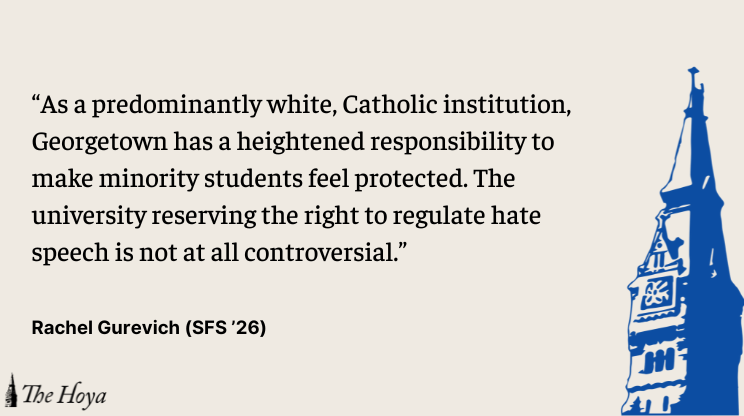Every year, the Foundation for Individual Rights and Expression (FIRE), a nonprofit civil liberties group focused on free expression, releases its College Free Speech Rankings, and each year, it ranks Georgetown University as one of the most oppressive universities toward free speech.
Georgetown University even received FIRE’s “Lifetime Censorship Award” in 2022 following an incident in which the administration censored a professor’s racially charged tweet about President Biden’s Supreme Court nominees.
In the 2024 report, FIRE’s latest iteration, Georgetown ranked 245 out of 248 universities for our record on free speech, next to institutions like the University of Pennsylvania and Harvard University at the bottom.
Georgetown is by no means an outlier, but does not deserve a “Lifetime Censorship Award” for its occasional mistakes.
Rather than focusing on the university’s actual free speech policies, FIRE’s rankings are overly critical of student self-censorship — or limiting one’s own speech for fear of repercussion — which is both natural on college campuses and necessary in most social settings.
FIRE’s ranking system is primarily based on undergraduate and recent graduates’ perception of free speech on campus and points to a specific set of speech concerns: self-censorship, whether that be social or governmental.
According to the report, out of 143 Georgetown graduate students — a relatively small sample size — surveyed, 59% say they have been self-censored at least once or twice a month on campus.
This seemingly innocuous fact is quickly followed by another statistic, which claims that for each conservative student, there are roughly 3.9 liberal students.
The examples cited by FIRE include students who have changed their responses to professors out of concern that they will be outed as being conservative-minded.
Another student wrote that they felt that Georgetown students villainize conservative viewpoints on campus, so they were uncomfortable sharing their own political values.
Unlike legitimate examples of the Georgetown administration stifling demonstrations or reprimanding speech, these instances deal with self-censorship, an idea that can be traced back to one of the fathers of free speech ideology: John Stuart Mill.
In “On Liberty,” Mill wrote that those who choose to share controversial or disruptive speech should be “justly punished by opinion, though not by law.”
Mill trusted individuals to determine whether their speech was socially acceptable, meaning that if we freely share an unpopular opinion, society has the right to react as it pleases.
This same logic is present at Georgetown and other college campuses. For example, you have the right to sit at the Right to Life table in Red Square, but anyone passing by also has the right to give you a nasty look.
As Mill acknowledges, however, there is a natural limit to what speech can be socially moderated and what requires legitimate regulation. If speech creates a dangerous environment, it’s the university’s responsibility to protect its students.
For example, when a swastika was found on the walls of Darnall Hall in spring 2023, the school condemned the hate speech to ensure the safety and well-being of Jewish students.
The university’s response was in line with its free speech policy, which states that “the freedom to debate and discuss the merits of competing ideas does not mean that individuals may say whatever they wish, wherever they wish.”
This policy neither discriminates against conservative nor liberal viewpoints. It merely states that if speech violates the University Harassment Policy, the school, a private institution, can regulate this expression.
As a predominantly white, Catholic institution, Georgetown has a heightened responsibility to make minority students feel protected. The university reserving the right to regulate hate speech is not at all controversial.
Other components of Georgetown’s speech policy are outwardly tolerant and combat the alleged conservative discrimination that FIRE accuses the university of.
The University’s Speech and Expression policy acknowledges it is not the role of the university to insulate students from unwelcome opinions.
“Fostering the ability of members of the University community to engage with each other in an effective and responsible manner is an essential part of the University’s educational mission,” the policy reads.
The university has occasionally diverged from this policy, warranting criticism. From refusing to recognize H*yas For Choice to stopping students from campaigning for Bernie Sanders, Georgetown’s track record on free speech does deserve criticism at times.
As a researcher for the Free Speech Project — an independent, non-partisan organization that assesses the status of First Amendment rights across the country — I’ve seen countless similar instances of collegiate encroachment on speech, ranging from no-contact orders for Christian groups to limitations on faculty expression regarding the Israel-Palestine conflict.
Rather than focusing on legitimate free speech violation, FIRE instead emboldens conservative complaints that Georgetown is too liberal, substantiating these concerns with examples of self-imposed speech limitations.
So, contrary to FIRE’s rankings, I, as a free speech advocate, do not think Georgetown is guilty of holding the abhorrent free speech policies the report claims we possess. And, as long as the Right to Life Table exists in Red Square, I’ll continue to exercise my right to give them whatever looks I please.
Rachel Gurevich is a sophomore in the School of Foreign Service.















Lou S. • Oct 6, 2023 at 4:06 pm
With “free speech advocates” like the writer ……